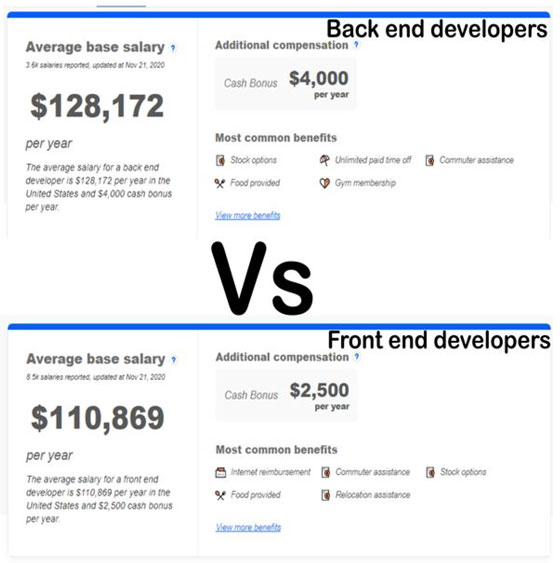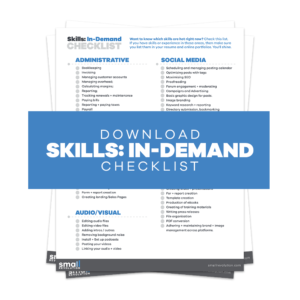You’ve finished your CSS3 or HTML5 Bootcamp, and you’re ready to start your dream job as a remote developer. But where do you start your quest for the best dev job?
That’s a good question.
Today, we’re going to talk about the four best entry-level web developer jobs for junior devs. We’ll also give you an insight into what such jobs entail in terms of education, skills, and personality traits.
And, finally, we’ll lay down a hassle-free roadmap you can follow to get started in the tech industry.
Let’s get right into it!
Which Are the Best Remote Jobs for Junior Web Developers?
The world’s necessity for more web devs increases year after year, making Web Development a high-demand job.
It also creates a new marketplace for remote web developers, who are taking our Virtual Assistant course to improve their client-management skills.
The sad part is that newbie web developers don’t have a clear path to follow when seeking remote-jobs.
But, thankfully, we’ve researched the four best jobs you can apply for if you’re a new web dev:
- Front End Devs: Junior front end developer in Digital Marketing agencies.
- Front End Devs: Junior front end developer in Startups.
- Back End Devs: Back end developer for Server and DB maintenance, which includes a paid internship.
- Back End Devs: Junior back end developer in Startups (with mentors).
Keep in mind that there’s a difference in what each type of dev does and how much they earn.
Here’s a quick reference to how much each type of web developer earns:

Junior Front End Developer in Digital Marketing Agencies
Digital Marketing agencies are a gold mine for front-end developers. The main benefits of this job are:
- It’s a remote, or remote-work compatible, position.
- You can opt for a full-time or mid-term post, or work as a freelancer.
- You’ll be able to learn from mentors and more experienced teammates.
- It’s a hands-on position; you’ll have plenty of work from the get-go.
- You won’t have to deal with customers directly.
- Depending on the agency, it’s a mid-to-high profit position.
This job will prepare you for a more complex market, and you’ll also be able to try professional-level apps for front end devs. This is perfect for those wanting to work as a WordPress Developer or UI Developer.
Junior Front End Developer in Startups
Startups usually demand that you fill in several positions at the same time.
You can either see this as stressful or as an opportunity to learn as much as you can. Its benefits are:
- You’ll be able to learn from lead or senior developers.
- You can tailor your position to your experience or interests — it’s perfect if you’re studying or a quick learner.
- It’s usually a full-time and extra-hours type of position, making it a more reliable source of income.
- You will communicate with customers directly.
Since it’s a demanding job, you will also improve your organization skills and learn to work under pressure. One thing, though — you’ll have to be highly confident in your skills to succeed.
You can find positions as a UI developer and Mobile developer, the latter being more suited for junior front end devs who want to turn full-stack.
Paid Internship as a Back End Developer for Server and Database Maintenance
Back end developers usually have a rough time finding junior positions, due to the crucial role that code will have in the functioning of an app, website, or platform.
This means you’ll earn more as a back end dev (once you have a decent portfolio) than a front end developer with similar skills. The main benefits are:
- You’ll be able to learn from industry leaders.
- This will give you practical experience that is vital to work as a back-end dev.
There’s always the chance that you can score a job after the internship ends. Usually, you’ll run into roles as a Test Developer or QA Tester.
Back End Developer in Startups
Startups offer grand opportunities when switching careers (or starting new ones). This job will work great for those who want to learn more about the front end counterpart.
In this type of job, the lines between dev types will be blurry or crossed occasionally.
- Depending on the startup, you’ll be able to practice your base skills.
- You’ll be able to learn from lead developers and tidy up your coding.
- You’ll gain critical experience to fill your portfolio.
Looking for this position will result in roles as a Software developer, JavaScript Framework developer, PHP developer, and so on.
If you want to be a Software developer, we highly recommend that you widen your expertise with some front end dev skills.
Where to Find These Junior Web Dev Jobs
There are many available marketplaces for you to advertise your services. Below, we’ve named a few that can get you started in the business:
- Upwork — The biggest online platform for freelancers.
- Working Nomads — Only remote jobs.
- Ruby inside — Perfect for back end devs.
- GitHub
- Stack Overflow — A perfect community for developers, with a growing base of 17 million professionals. There’s your competition.
- Remoteplatz — A growing community with less competition, which makes it an efficient first option.
- Indeed — A staple in the industry that can also get you presential jobs.
- Startupers — The best one, by far, to score a job in a startup.
We recommend that you pick Upwork first, as it’s perfect to gain experience and a few bucks at the starting point of your career.
When you feel confident enough, you can step out of it and start checking out more competitive sites, like Working Nomads, GitHub, and Stack Overflow.
Vital Developer Skills and Knowledge to Get Started
The jobs you can gain as a web developer depend on the tools, knowledge, and experience you have.
With that in mind, all junior web developers should master HTML/HTML5 and CSS/CSS3, which are industry staples nowadays.

But that’s not all — depending on the type of developer career you want to pursue, you’ll have to amass as much knowledge as you can.
There are three types of web developers: front end, back end, and full-stack.
Here’s a brief explanation, and some of the programming languages you should add to your CV:
- Front end developers work on the UI part of a website, meaning everything the user can see.
Complementary knowledge: Photoshop, UI design, Adobe toolkit, JQuery, JavaScript frameworks (like React), responsive web design, design thinking. - Back end devs determine the functionality of a website or app.
Complementary knowledge: PHP, Phyton, Node.js, Ruby, SQL language and database functions, servers. - Full-stack developers can handle both functionality and appearance. This means they should dip their toes in some — if not all — the tools mentioned above.
The good thing is that, since this is a high-demand position, there are hundreds of educational tools for wannabe devs.
Remote Teammate Traits
There are a few traits, aside from knowledge, that come in handy when working remotely. These are:
- Being an efficient communicator to your mentors and teammates.
- Being responsible, organized, and self-motivated.
- Being innovative, resourceful, and thinking outside of the box.
Yet another aspect to keep in mind is that you need to gear up — technologically speaking.
You’ll need a well-equipped home office (phone, pc, desk, and so on) to optimize your output. Your earnings, comfort, versatility, and professional appearance will improve if you have the right tools.

How to Gain Experience as a Web Developer
I know what you’re thinking. “How on earth will I get that much experience without getting a job first?”
To be honest, it can be done — especially if you get proper education first.
If you want to start this journey in the most efficient manner, you should check out our course about working with online teams. It will equip you with a deep understanding of the tools you need to start working in any remote position.
One more appealing trait to add to your CV, along with your coding skills, before sending it.
You can also gain experience with hands-on web-development courses, boot camps, and in different price tiers. Other alternatives include:
● Your own web design projects, apps, and more.
● Freelancing, which is junior-dev friendly and profitable.
● Creating a professional portfolio.
● Cooperating with open-source projects.
All that’s left is for you to start checking out companies. Learn what they’re looking for in a candidate, and then become that candidate.
Are you confident in your current skills?
Photo by diana.grytsku / CC BY


